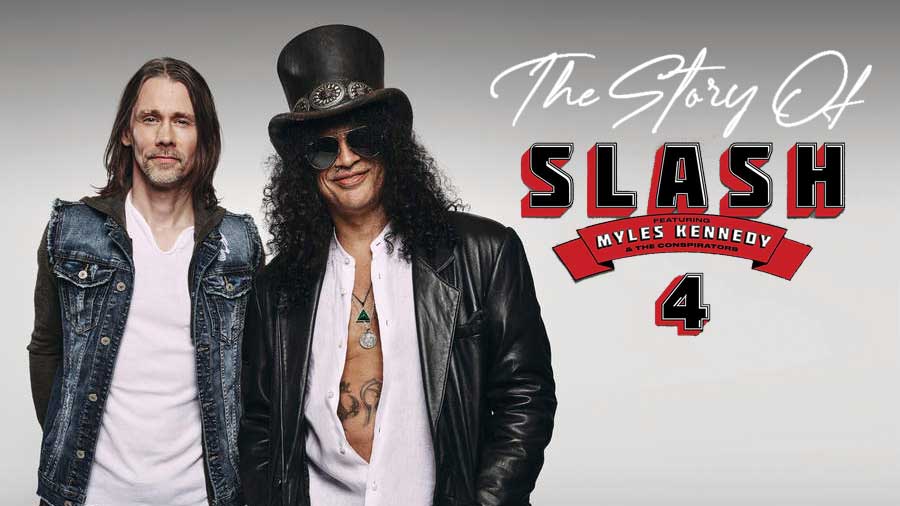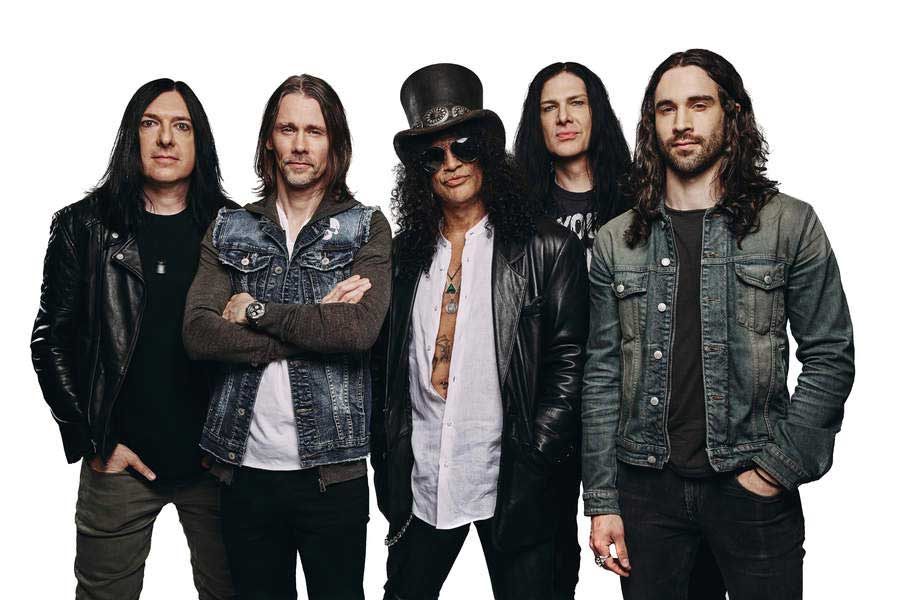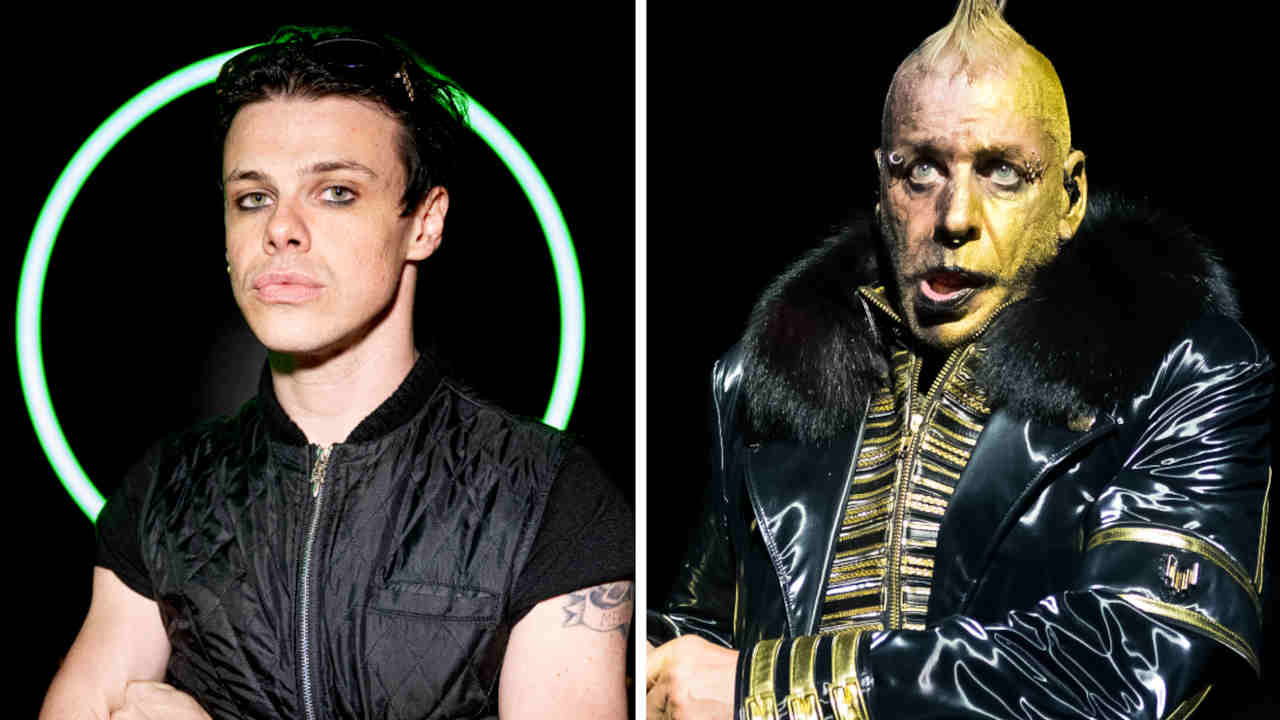Slash and Myles Kennedy: despatches from the brink of darkness
Slash’s fourth album with Myles Kennedy And The Conspirators was shaping up to be the smoothest sailing of his chaotic career. Then covid blew in and rocked the boat

Last March, five days into sessions for his fourth album with Myles Kennedy And The Conspirators, Slash’s mobile lit up while he was in the studio. Nothing unusual about that, for a man who has spent the past five years fielding the twin demands of a reunited Guns N’ Roses and a snowballing solo career. But when he glanced at the screen he was bemused to see the caller ID of the singer with whom he was then recording at Nashville’s RCA Studio A.
“It was Myles Kennedy,” he recalls today. “I was like: ‘What the fuck? He’s already here. Why is he calling me?’”
Slash gives the dark chuckle of a man safely on the far side of a cataclysm. “The first five days of making this record were the most fun I think we’ve ever had in the studio. And then – boom. Suddenly there was this dark cloud over the whole thing.”
Let’s rewind. By rights, and in a sane universe, new album 4 should have seen Slash, Kennedy and The Conspirators – completed by stalwart sidemen Brent Fitz (drums), Todd Kerns (bass) and Frank Sidoris (guitars) – continue their swagger. “With your freshman effort,” considers Kennedy, “you haven’t known this person long. Do you trust their instincts? But if you’re lucky enough to get to your fourth record, there’s definitely a relationship.”
“This band hasn’t gotten stagnant or uninspired,” picks up Slash. “I think that original music is infinitesimal. Whether it’s riffs, melodies or whatever, you’re just trying to unlock them all. That’s the journey, right?”
Kennedy nods. “I heard an interview with Ozzy and he said: ‘There’s only twelve notes.’ And in Western music, he’s right. It’s just math. But I believe there are still riffs out there that have not yet been tapped in to. And those of us foolish enough to climb that mountain will hopefully find them.”
Slash certainly didn’t appear to struggle to excavate the 10 gold nuggets on 4. He says all but “two or three” were written pre-pandemic. Perhaps, if things had worked out differently, they could have been claimed for the long-mooted next GN’R album (although we’re left to wonder, given that asking after Axl and co. means a slapped wrist from the chaperone on our Zoom call).
Sign up below to get the latest from Classic Rock, plus exclusive special offers, direct to your inbox!
In any case, the demos that Slash drip-fed to Kennedy through last year seem tailor-made for the Alter Bridge frontman’s feline voice, right from the moment he locks in with the frantic tremolo-picked opener The River Is Rising.
“That lyric came after I watched a series about cults,” says Kennedy. “The song announces itself right out of the gate. It’s a fun one to belt out.”
"With the original arrangement of The River Is Rising, the fast bit was only at the end,” Slash explains of the manic double-time section that has shades of Paradise City. “But our producer, Dave Cobb, said we should make it the guitar solo. And that was something that we did inside the space of twenty minutes, totally spontaneous. I’d never actually soloed to that part before."
It’s one of several new moments you can imagine gluing fans to the stage barrier when the Slash touring machine cranks back up in February. Try the stormy talk-box riff of C’est La Vie, matched to Kennedy’s observations of a woman outrunning “an abusive relationship, a dark situation”. Take the crunking crawl of Whatever Gets You By, which has a lyric about watching “day traders betting the farm on the Robinhood trading app”.
“That one came out heavy,” says Slash, “with a Godzilla cadence.”
Or perhaps you’d prefer the faint Ziggy Stardust vibe of Fall Back To Earth.
“It’s funny you should mention that,” says Kennedy. “Dave Cobb said the exact same thing, that it’s very Bowie-esque. It’s the quintessential Slash guitar hook. As for the lyric, it’s a tale that’s been told many times. I had a music school teacher, way back in the day, who told me: ‘Don’t gain the world, only to lose yourself.’ That really stuck with me. Keep it real, as they say. I thought those were important words of wisdom to live by. And thirty-odd years later, I should have got that phrase tattooed on me somewhere.”
Maybe something a little more left-field? On a generally adventurous album, the odd man out is the Eastern adventurism of Spirit Love, its sitar/ bazaar-evoking twang offset by the kind of quicksilver neo-classical solo you’d peg as Yngwie Malmsteen or Ritchie Blackmore.
“It’s got a sexy swagger,” says Slash. “A certain nastiness that appeals to me. As a regular person, verbally, I don’t emote a lot to people. But on guitar I really find that is an outlet.”
As for Kennedy, he had a beyond-the-grave hook-up in mind: “Spirit Love is written from the perspective of someone who thinks they’re having relations with a ghost. But by the end of the song, the person realises they’ve been a ghost as well and, essentially, this whole thing has been going on in the spirit realm. When I hear it I see a cobra coming up out of a basket.”
Perhaps the new album’s most immediate – albeit unintentionally hilarious – moment is Fill My World, whose spiralling, Sweet Child O’ Mine-style riff sets up a heartfelt lyric revealed as a shaggy-dog story.
“I thought that Fill My World was just such a sweet and almost sad song,” recalls Slash, of hearing Kennedy’s lyric for the first time. “I was totally thinking about a human relationship. And it turned out it was about his dog.”
“That one was inspired by an event that happened a few years ago,” says the singer, straight-faced. “My wife and I were trying to get home, but this horrible storm came through, and we were watching our Shi Tzu on the camera as this whole thing was playing out. It was heartbreaking, because he was terrified, running around the house, trying to hide.
"The song is written from his perspective, the narrative that might have been going through his head. Some people are like: ‘Come on, it’s just a dog.’ But it’s from a sincere emotional place, and you hear that on the album. My voice cracks a bit.”
You can imagine that riff becoming a guitar shop standard, we suggest to Slash.
“I was a little apprehensive about sending it to the guys, because it’s very ballady,” he admits. “I don’t compare the riff with Sweet Child O’ Mine, and I don’t have those kind of expectations, but it is a little bit like that. I don’t even know what people play in guitar stores these days!”
By spring 2021, with the album prep complete, the band were tasked with reaching Nashville without becoming covid’s latest statistics.
“We’re not gonna take a commercial flight,” reasons Slash, “so we thought the safest way to get there would be to take a tour bus, right? So we all tested – negative – and got on the bus.”
“The vaccine still wasn’t available for everybody,” adds Kennedy, “so it was a bit of a risky proposition. We had protocols in place to hopefully ensure safe travels. But it turned out a little different in that respect.”
Over those first five days, they broke the back of the record, thanks not only to the line-up’s tight musical telepathy, but also to Cobb’s knack for tracking bands live in the studio and getting the shower of sparks down on tape.
“We’re a vibe band,” says Kennedy. “The human aspect has not been quantised out of 4, like so many records can be if you’re not careful. I think it’s also about not having any grand expectations, going into it. I try not to have any sort of weight. I want it to be pure and in the moment. Just let it happen. Let the universe instruct you as it sees fit.”
“The whole record is very off-the-cuff,” adds Slash. “It’s the only one where I didn’t go back and re-do the guitars. So there’s little glitches in solos like Actions Speak Louder Than Words and C’est La Vie, but it’s all part of the character. I’m more of a spontaneous player, so that’s one of the reasons why I love playing live, because you’re just thrown into the situation and it’s do or die.
"I have to admit, I get anxiety in the studio. I’m not the ‘studio guy’. As soon as that red light comes on, you’re conscious of other things. I enjoy doing it… but I’m doing it to get out!”
But when the band reached that fateful fifth day, getting out of the studio suddenly seemed to be a vanishing possibility. “So my phone rings,” says Slash, picking up the thread, “and it turns out Myles had tested positive for covid. The way he got it was he picked it up at a rest stop on his way to meet the tour bus. But it didn’t show up at the time he took the test. It was a good thing we got the record done before he realised he had it, because I think it would’ve put a lot of pressure on him psychologically.”
From there, Slash recalls, the virus ripped through the Conspirators line-up.

“So now everybody starts getting sick. Consequently, Brent and Todd tested positive too. I went and got vaccinated. Then two days later I tested positive, because even though the band were all quarantined, we were sharing the same kitchen. It wasn’t too bad for me, but Todd had some pretty strong symptoms, and it was hard on Brent and Myles. I wouldn’t wish covid upon anybody, because it’s a fucking grab-bag of ailments. You don’t know what you’re gonna get."
Somehow, by assembling the record’s final elements in quarantine, and using Kennedy’s scratch vocals, the band got 4 over the line. “Then we drove the bus back to LA,” says Slash. “It’ll always be one of the most memorable experiences I’ve had. A unique bonding experience.”
Kennedy breathes a belated sigh of relief, as though it’s only now that he accepts they dodged the bullet. “We have another one in the can. And we managed to do it during a very difficult time. So it’s kind of a miracle.”
That 4 got made at all is a triumph. But then perhaps the quality of this record is testament to the merits of making rock’n’roll on impulse and under fire. For his part, Slash has dubbed it “probably the best one we’ve done so far”, and cagily stands by that sound bite today, with the caveat that he hasn’t listened to it for months. “As soon as it was done mastering, I put it away. I’m excited about it actually coming out, and hearing what we did.”
As for Kennedy, he suggests we let the album percolate and see where it stands in the catalogue further down the line. “Our best album yet? That’s a good question. Ask me again in ten years.”
How about present day, then. What kind of music do you think people need right now?
“I think it’s about sincerity and coming from the heart,” considers Slash. “Because we’ve really tested our capacity and patience for each other. I think coming together is something we really need as a species, and music is the greatest tool for that. But it’s gotta come from a true place; it can’t come from some superficial marketing and commercial top-forty-based idea.”
In closing, we remind Slash that he has now released 14 studio albums. That’s more than his formative heroes like Jimmy Page. Did he ever envisage himself amassing such a catalogue when GN’R put out Appetite For Destruction?
“In 1987, I didn’t think I was gonna be around until eighty-eight,” he says, smiling. “I had absolutely no predictions for the future. Just like I don’t really sit here now thinking about what’s gonna be happening in 2030. I just put one foot in front of the other."
Henry Yates has been a freelance journalist since 2002 and written about music for titles including The Guardian, The Telegraph, NME, Classic Rock, Guitarist, Total Guitar and Metal Hammer. He is the author of Walter Trout's official biography, Rescued From Reality, a music pundit on Times Radio and BBC TV, and an interviewer who has spoken to Brian May, Jimmy Page, Ozzy Osbourne, Ronnie Wood, Dave Grohl, Marilyn Manson, Kiefer Sutherland and many more.

